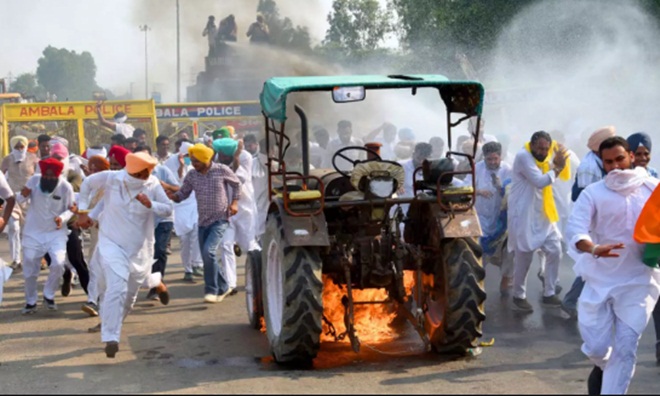Vijay Sardana
Over the last few weeks, farmer protests have been in spotlight and dominated the national discourse. Thousands of agitators especially from Punjab and Haryana have escalated their protests choking several road links connecting to the Capital. A few farmers have unfortunately lost their lives too, presumably due to cold weather.
Several rounds of talks between farmer leaders and central ministers have failed to break the deadlock. This has led to an unwarranted situation, both politically and socially.
The farmer organisations have refused to share their specific demands and insisted for repeal of the three farm laws enacted by the Parliament last September. The government on its part has shown readiness to tweak some clauses but is certainly in no mood to withdraw the law.
The primary concern or apprehension of the protesters and those opposed to the laws is that government may gradually do away with minimum support price (MSP) and let market forces decide the prices as is the case with most goods and services in the country. It may be noted that the apprehensions are not related to the Acts but pertain to MSP.
The other two key arguments for repealing the laws are that contract farming law would help corporates and removal of stock holding limits would hit both farmers and consumers. The fact is contract farming law is optional and not compulsory. Removal of stock holding limit is only for agro-processors, exporters and participants in the value-chain. No other person is allowed to stock beyond limit specified in the Essential Commodities Act which remains in place. The exceptional clause has been inserted to help the processing industry and exports so that farmers’ off-take can increase.
Fears expressed by protesters are totally unfounded as the fact is that the three laws are actually in line with the current need of Indian farmers. The only people who need to worry are commission agents who are bullying the system in the shadow of farmers. While government has already assured farmers that MSP will continue as it is, there is certainly need to reform the current procurement system of FCI so that benefits reach poor farmers instead of the rich and wealthy.
Why rich people should be allowed to sell their produce to Food Corporation of India (FCI) at MSP while poor farmers are suffering? After all it is taxpayers’ money and should go to them when they need them.
As regards the Farmers (Empowerment and Protection) Agreement of Price Assurance and Farm Services Act is not binding. It only provides an option to those who want to get into an agreement with companies for contract farming. This law actually seeks to prevent corporates from backing out once an agreement has been reached with the farmers. It provides for punishment in case companies pull back from the agreed terms. This is aimed at plugging the loopholes in the system that puts farmers at disadvantageous position.
Then the other issue raised by farmers is about removing stock holding limits. It has been said that this would encourage hoarding and black-marketing. Again, this is complete misunderstanding. Can any government afford to let prices of essential commodities rise? There have been massive protests in various countries against the government of the day when prices of essential items went beyond a limit. In India, political parties have been sent packing for their inability to control food prices.
So, every politician is sensitive and that is why too many levers to control prices. The government cuts custom duty as and when needed to ensure enough supply of essential food items. The logic that removal of stock limits would let corporates control prices, therefore, does not hold. Government of the day is fully aware of adverse impact of high food prices on economy and consumers.
Some of the farmer leaders have claimed that dismantling of mandi system has not helped farmers in various states. This is correct but it has to do more with the alternate arrangement. Central government cannot touch mandi system because it is a state subject. If mandi system is failing it is because of states and not the Centre. If state governments want mandi system to remain in existence and perform better they have to review the functioning of the mandi system. The Union government cannot intervene in that process.
To explain it further, Bihar is one of the key producers of wheat, maize and milk. Why is it that the farmers producing milk are better-off than those growing wheat and maize? It is because they are part of the cooperative system in the dairy sector. They need to adopt the same in the areas of wheat, maize and other agri produce.
Instead of providing justifiable and reasonable logic to improve the law, protesters in Delhi and elsewhere are demanding repeal of the laws. When they don’t want to discuss the issue and just want withdrawal of the laws then there is certainly some other agenda.
Going by this logic it seems that they just want to bully the system. If Parliament passes a law and mob comes and asks for its withdrawal and government withdraws it under pressure then what is the utility of the Parliament. Then it is not democracy but ‘mobocracy’. This is not the way a country can run because tomorrow all the taxpayers come together and demand exemption from income tax.

(Vijay Sardana is well-known Techno-Legal Advocate, Dispute Mediator, Contract Negotiator and Arbitrator. He is a Trade Policy Expert with focus on Risk Management and Regulatory Compliance. Views are personal)

